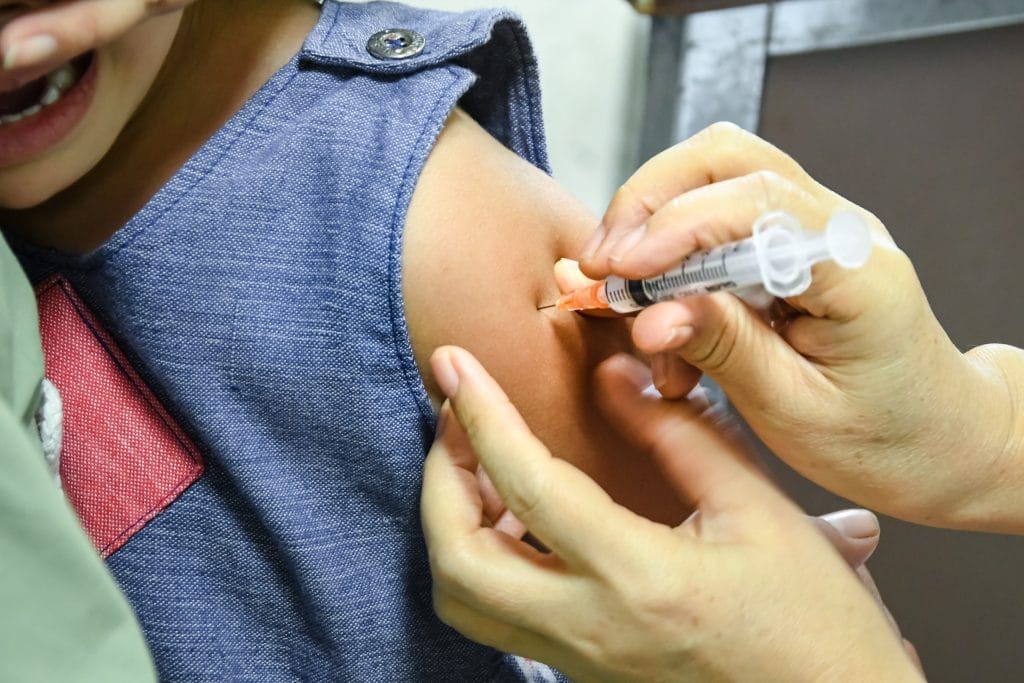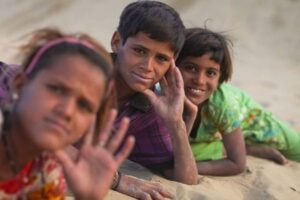
2.9 million Indian kids missed out on the first dose of their measles vaccinations in the last eight years, according to the United Nations.
A report by the UN Children’s Fund (UNICEF) reveals that more than twenty million children worldwide missed out on the all-important first dose of the measles vaccine in the past eight years, escalating the risk of outbreaks of the disease. In total, almost 170 million children under the age of ten are unvaccinated.
The publication of the report coincides with World Immunization Week, which is observed in the last week of April every year, to raise awareness about the importance of vaccination. Measles is an entirely vaccine-preventable disease. However, in recent years, it has seen a comeback.

“India ranks second, worldwide, in the number of children unvaccinated against measles”
The World Health Organization (WHO) revealed earlier this year that cases of measles had jumped in every region of the world in the first quarter of 2019, compared to the year before. Worldwide, measles cases quadrupled. India reported 7,246 confirmed cases of measles as of April 9th in 2019. In 2017, India reported 68,841 confirmed measles cases.
India ranks second, worldwide, in the number of children unvaccinated against measles, trailing only Nigeria. This marks a failure for both countries to improve their ranking compared to previous estimates.
That so many children are unvaccinated against measles threatens Government targets of eliminating measles from India by 2020. Vaccination coverage for the 2015-16 period stood at 81.1 percent for the measles-containing vaccine first-dose (MCV1). This is far below the 95 percent threshold needed to facilitate elimination by ensuring “herd immunity” against contagious diseases as prescribed by the WHO.
This is despite the inclusion of the measles-rubella (MR) vaccine in the Government’s Universal Immunisation Programme (UIP), the largest initiative of its kind in the world. The UIP has successfully reached millions of hitherto unvaccinated Indian children and pregnant women through the campaign.

“Vaccine scepticism, fuelled by anti-vaccination misinformation, may be one of the factors driving the uptick in measles and the number of unvaccinated kids. A recent example from central Mumbai attributed a measles outbreak to misinformation-fuelled vaccine refusal. Other factors include difficulty accessing remote and/or isolated populations; lack of awareness; and operational gaps.”
However, various challenges limited its outreach and prevented many of the UIP targets from being met. According to a British Medical Journal (BMJ) study, districts covered under the Intensified Mission Indrahadush (IMI) component of the UIP – which sought to increase coverage to ninety percent in targeted districts – increased their coverage only to 69 percent.
Vaccine scepticism, fuelled by anti-vaccination misinformation, may be one of the factors driving the uptick in measles and the number of unvaccinated kids. A recent example from central Mumbai attributed a measles outbreak to misinformation-fuelled vaccine refusal. Other factors include difficulty accessing remote and/or isolated populations; lack of awareness; and operational gaps, according to the BMJ.
“Measles is far too contagious. It is critical not only to increase coverage but also to sustain vaccination rates at the right doses to create an umbrella of immunity for everyone.”
The latest findings concerning measles show that immunisation coverage must increase if there is to be any hope of eliminating measles from India within the coming years. The country has much to gain from eliminating measles. Vaccination against measles saved the lives of tens of thousands of Indian children between 2010 and 2013 alone. If more lives are to be saved, efforts to immunise against the disease must be redoubled and reasserted.
“The ground for the global measles outbreaks we are witnessing today was laid years ago,” said Henrietta Fore, UNICEF Executive Director, in a press release. “The measles virus will always find unvaccinated children. If we are serious about averting the spread of this dangerous but preventable disease, we need to vaccinate every child, in rich and poor countries alike.
“Measles is far too contagious. It is critical not only to increase coverage but also to sustain vaccination rates at the right doses to create an umbrella of immunity for everyone.”
The UNICEF report can be accessed here.

